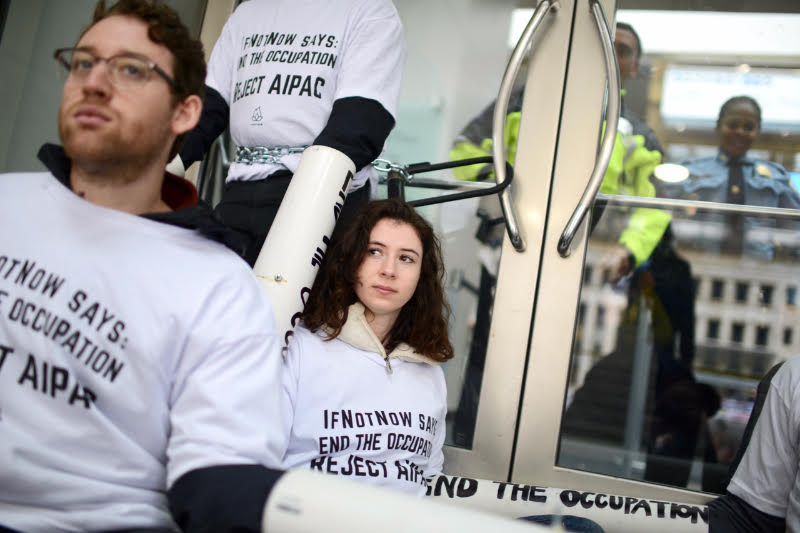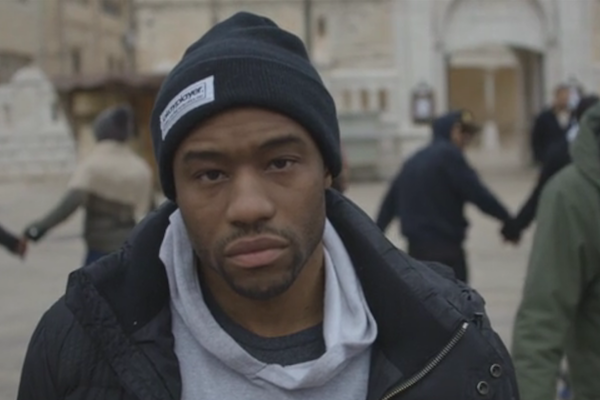On April 13, Democratic primary candidate Cory Booker launched his campaign at a kickoff event in Newark, New Jersey with a slogan of “Justice for All.” Booker’s slogan quickly came under fire from student protesters who responded to his vocal support for pro-Israeli government policies with cries of “Justice for Palestine!”
The protest was just the latest example of increasing left-wing skepticism of Democratic candidates like Booker and former prosecutor Kamala Harris, who have sought to rebrand themselves as progressives despite long held centrist positions upholding the status quo of U.S. foreign and domestic policy.
Senators Cory Booker and Kamala Harris’ hawkish records on Israel have come with serious consequences for Palestinians and their supporters.
Cory Booker has long been one of the most stridently pro-Israel voices in the Democratic Party, traveling to Israel and participating in AIPAC’s policy conference on multiple occasions, and even praising Israel on the Senate floor during the deadly 2014 invasion of Gaza. He was the lone democratic co-sponsor of the Israel Anti-Boycott Act, which, in its original form, sought to criminalize support for BDS in certain contexts and was condemned by free speech advocates.
Kamala Harris also has a long record of support for Israel, including previous AIPAC appearances and photo-ops with Israeli Prime Minister Netanyahu. In 2017, she co-sponsored a Trump-backed Senate bill condemning Obama’s refusal to veto a UN Security Council resolution pushing back on Israeli settlement growth.
Bipartisan support for Israel is also one of the most visible places where some Democrats are on the same page as the Trump Administration, which has shown unconditional support for the Netanyahu Government through its Jerusalem Embassy move and recognition of Israeli claims on the occupied Golan Heights.
Their positions stand in stark contrast to the increasingly Israel-critical views of progressives, who are connecting Palestinian rights to a host of other racial and social justice issues. This disconnect speaks to a growing gap between the pro-Israel policies advocated by many democratic mainstays and a left-wing democratic voting block that is increasingly critical of Israel.

Blackwashing
Both Harris and Booker present their support for Israel as an extension of their reverence for the U.S. Civil Rights Movement. When Harris spoke at AIPAC in 2018, she cited the voting rights march from Selma to Montgomery as her inspiration for being there, and referred to “shared values” between the U.S. and Israel. Booker’s 2019 AIPAC remarks made similar connections with a lengthy conclusion tying the lessons of Martin Luther King Jr.’s assassination to his love for Israel.
But in trying to couch their support for the Israeli government in Black American struggle, both Senators set themselves sharply at odds with many Black activists, who for decades have drawn connections between Palestine solidarity and Black liberation. They also appear dangerously out of touch in light of Israel’s violent repression of Palestinian protesters, which in the past year has resulted in more than 190 people killed and at least 28,000 injured during the Great March of Return demonstrations on the Gaza border fence.
Even worse, these comments also fall into a disturbing pattern of Blackwashing Israeli occupation and Apartheid, which has been a long-held tactic of AIPAC and other groups seeking to shield Israel from critiques. AIPAC has specifically targeted students at Historically Black Colleges and Universities with trainings to combat organizations like Students for Justice in Palestine on campus, with a specific eye on pushing back on charges that Israel’s separate legal system for occupied Palestinians amounts to apartheid.
Blackwashing also has the effect of covering up anti-Black racism in Israel; organizations like StandWithUs often circulate images of successful Ethiopian Israelis to present the country as racially just. Such images stand in stark contrast to a country rocked by mass demonstrations of Ethiopian Jews earlier this year, who blocked Tel Aviv’s main thoroughfare to protest the police killing of Yehuda Biadga and other state violence against their community.
Israel has also used photo-ops with Black leaders to create an image of normalcy in the face of criticism of it’s anti-Black policies. Kamala Harris’ November 2017 photo-op with Netanyahu came just weeks after Israel announced the mass expulsion of non-Jewish African asylum seekers to countries where they faced potential trafficking to Libya.

The Power of Solidarity
As galling as Harris and Booker’s unflinching support for the Israeli government may be to some progressives, politically speaking, this has been one of the safest foreign policy positions to hold in U.S. politics for decades. This is doubly true for Black leaders seeking office, who are consistently targeted for their solidarity with Palestinians.
The controversy around Minnesota Representative Ilhan Omar’s criticism of AIPAC’s lobbying influence on U.S. politics is one of the clearest examples of how Black politicians are held to an especially high standard when it comes to criticizing Israel. Omar’s censure by the Democratic Party followed a slew of other public censures of Black activists who support Palestinian rights, and was criticized by many as a stronger rebuke than what Republicans receive for blatant anti-Semitism and Islamophobia.
But even as Black leaders face serious consequences for their solidarity with Palestinians, in some cases losing jobs and accolades, they have increasing support from young progressives who value their actions as part of a vision of shared struggle. Democrats seeking office would be wise not to dismiss Palestine solidarity as an isolated issue, but instead understand that it is increasingly part of the fabric of the social movements changing U.S. politics.
Ilhan Omar’s support of Palestinian human rights is part of a broader opposition to U.S. imperialism that has included critiques of Saudi Arabia and U.S. intervention in Latin America, grounded in her own experience as a Somali refugee. She was part of the same progressive mid-term election wave that brought in Alexandria Ocasio-Cortez and Rashida Tlaib, the first Palestinian woman to serve in Congress.

Black activist and scholar Marc Lamont Hill’s pro-Palestinian comments at the UN, which resulted in his firing from CNN, were partially informed by his participation in a Dream Defenders delegation to Palestine. Their organizing has directly challenged the U.S. prison-industrial complex and their grassroots efforts aided a broad-based struggle to restore the voting rights of most people convicted of felonies in Florida in 2018.
The Dream Defenders activism reflects the way that prisons and policing are key issues affecting both U.S. Black communities and occupied Palestinians, and are a historical point of solidarity between them. Ties between the two struggles go back decades, from the political prisoners of Black Power and Third World solidarity movements of the 1960s and 70s, to the streets of Ferguson, where protesters received advice from Palestinians on how to treat tear gas inhalation over Twitter.
The Movement For Black Lives similarly highlighted solidarity with Palestinians in its policy platform, calling for the divestment of U.S. military aid to Israel and investment in Black communities, a move that caused some pro-Israel groups to declare their opposition to Black Lives Matter organizing as a whole.
Palestine solidarity is also becoming increasingly visible and inextricably connected to a host of other progressive issues. Human rights groups on the U.S.-Mexico border are making connections between Israeli-made Eblit drones and other electronic monitoring equipment and the surveillance, criminalization, and deaths of migrants. Indigenous activists have also connected this equipment to U.S. Customs and Border Control encroachment on Tohono O’odham lands bisected by the border.
Shifting Politics
While it may be tempting to chalk Harris and Booker’s support for Israel up to political expediency or label them “progressive except for Palestine,” the truth is a little more complex. Both candidates have a history of endorsing a slew of other neoliberal policies that put them at odds with the same progressives pushing back on their Israel policy.
Since announcing her candidacy, Harris has come under fire for her record as a prosecutor, which included opposing investigations into police misconduct, creating barriers for exonerating the wrongfully convicted, criminalizing low-income parents for child truancy. Harris’ troubling record on both Palestine and prisons, and its contrast to imperatives fueling current Black and pro-Palestinian activism, speaks to the fact that mass incarceration of marginalized communities is a darker side of the “shared values” between the U.S. and Israel she and Booker claim to uphold.
The radical activists doing the groundwork that is fueling the progressive wave of the current election cycle view these complex foreign and domestic issues as part of interconnected systems of oppression. As democratic primary candidates like Booker and Harris seek to rebrand themselves in an election season that is increasingly pushing politics to the left, failing to do so runs the risk of them being left behind by the very same progressive wave they seek to ride. Even if they succeed, they will have to contend with voting and policy records that show their complicity in the very systems of oppression progressives have been fighting against.
